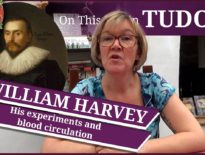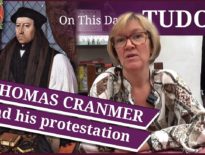On this day in history, 31st March 1631, the Tudor and Stuart metaphysical poet, satirist, lawyer and clergyman John Donne died.
Donne had an amazing career, going on voyages, serving as a royal chaplain and diplomat, and writing sermons, songs, satires and poetry, including an erotic poem, "The Flea".
Find out more about John Donne and hear some of his work in today's talk.
Read more about John Donne and his work on the Poetry Foundation website - https://www.poetryfoundation.org/poets/john-donne
Mediation 17 can be read at http://www.luminarium.org/sevenlit/donne/meditation17.php
The Flea can be read at https://www.theguardian.com/books/booksblog/2019/dec/09/poem-of-the-week-the-flea-by-john-donne
Also on this day in Tudor history, 31st March 1532, Henry VIII was left fuming after Friar William Peto likened him to King Ahab and Anne Boleyn to Queen Jezebel, and preached against his quest for an annulment of his marriage to Catherine of Aragon. Find out more in last year’s video:
Also on this day in history:
- 1499 – Birth of Pope Pius IV, born Giovanni Angelo Medici, in Milan. He was Pope from 1559 to 1565.
- 1509 – The dying Henry VII made his last will and testament at Richmond Palace, three weeks before his death. It was based on an earlier draft, with some new provisions added, for example, the addition of Sir Richard Empson and Edmund Dudley to the list of executors.
- 1519 – Birth of Henry II of France, at Château de Saint-Germain-en-Laye, near Paris, Henry was the son of Francis I and Queen Claude, and he was King of France from 1547 to his death in 1559. His consort was Catherine de' Medici.
- 1547 – Death of Francis I of France, at the Château de Rambouillet in the Île-de-France, and accession of Henry II on his 28th birthday.
- 1553 – Edward VI dissolved Parliament, after having opened it on 1st March. It was his last Parliament.
- 1596 – Birth of René Descartes, French philosopher, mathematician, and writer, the “Father of Modern Philosophy”, at La Haye en Touraine in France. He is known for his dictum “I think, therefore I am”.
Transcript:
On this day in history, 31st March 1631, in the Stuart period, metaphysical poet, satirist, lawyer and clergyman John Donne died. Donne served as a member of Parliament, Royal Chaplain and Dean of St Paul’s, but is best known for his poems, sonnets and epigrams, which included the meditation “For whom the bell tolls” and the erotic metaphysical poem “The Flea”, which is thought to have been written in the 1590s.
Here are some facts about this famous metaphysical poet:
• John Donne was born in Bread Street, London, in his father’s house, in 1572, although his exact birthdate is not known.
• He was the son of John Donne, warden of the Ironmonger’s Company, and his wife, Elizabeth Heywood.
• His maternal grandfather was John Heywood, the Tudor playwright and poet.
• Donne was brought up a Catholic.
• He was educated at Hart Hall, Oxford, and then studied at Thavies Inn, an inn of the chancery, before being admitted to Lincoln’s Inn, one of London’s inns of court.
• In 1596, he joined the expedition led by the Earl of Essex and Lord Howard of Effingham to Cadiz, and then again in 1597 to the Azores. On his return, he worked as secretary to Sir Thomas Egerton, Lord Keeper of the Great Seal.
• By 1601, Donne was serving as a Member of Parliament and had embraced the Protestant faith.
• In December 1601, Donne secretly married seventeen-year-old Ann More, the niece of Lady Egerton. When her father, Sir George More found out about the marriage, he had Donne arrested and imprisoned in the Fleet. Donne was soon released though and was able to prove that the marriage was valid. Ann’s father cut her off financially as punishment. They had their first child, a daughter, Constance, in early 1603.
• In January 1615, Donne was ordained as a Church of England deacon and priest, and he served as a royal chaplain to King James.
• Donne’s wife, Ann, died in 1617 after giving birth to their twelfth child, who was stillborn. Donne preached the funeral sermon.
• Donne was also a diplomat, being sent on an embassy to Germany in 1619.
• In 1621, he was made Dean of St Paul’s.
• Following King Charles I’s accession in 1625, Donne was made a prolucator to the king.
• Donne died on this day in 1631 at the deanery of St Paul’s. He was laid to rest in St Paul’s Cathedral on 3rd April 1631.
• His memorial thankfully survived the Great Fire of London and can now be seen in the present St Paul’s Cathedral.
• Donne didn’t just write poems, he also wrote sermons, religious verse and treatises, epigrams, songs, satires and translations.
• His poem “The Flea” is about the writer, the man, trying to persuade a woman to have sex with him. The Guardian Newspaper described it as “sharp romantic comedy”, and I’ll give you a link to read it.
• His meditation XVII which begins with the words, “PERCHANCE he for whom this bell tolls may be so ill as that he knows not it tolls for him” is also very famous. My favourite bit is this:
“No man is an island, entire of itself; every man is a piece of the continent, a part of the main; if a clod be washed away by the sea, Europe is the less, as well as if a promontory were, as well as if a manor of thy friend's or of thine own were; any man's death diminishes me, because I am involved in mankind, and therefore never send to know for whom the bell tolls; it tolls for thee.”




Leave a Reply